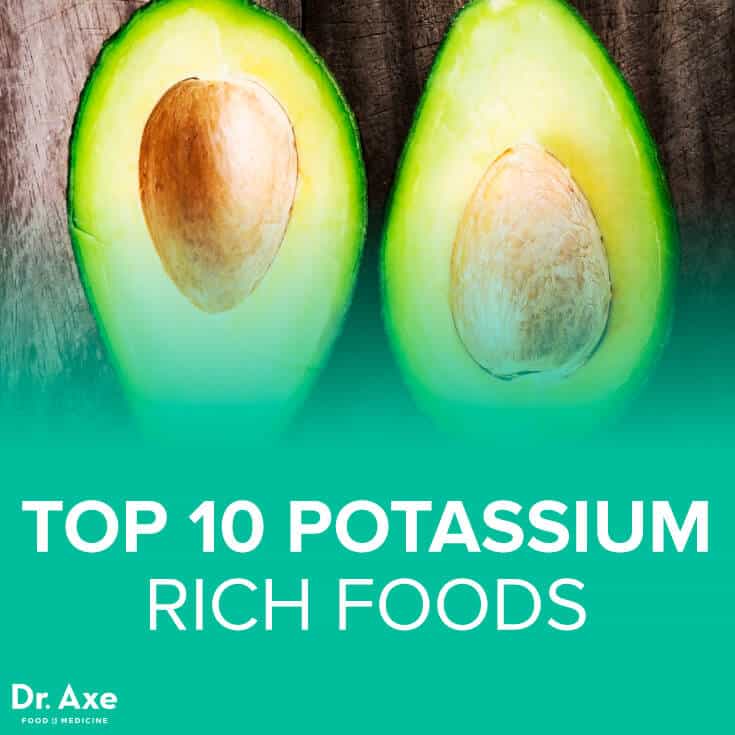Potassium is an essential nutrient used to maintain fluid and electrolyte balance in the body.
Potassium
is the third most abundant mineral in the body and is a required
mineral for the function of several organs including the heart, kidneys,
brain and muscular tissues.
Potassium
also plays an important role in keeping the body hydrated and works with
sodium to support cellular function with your bodies sodium-potassium
pump.
Potassium deficiency symptoms can include severe headaches, dehydration, heart palpitations and swelling of glands and tissues.
Also, potassium deficiency can lead to:
- Fatigue
- Irritability
- Muscle cramps
- Weight gain
- Increased blood pressure
- Cellulite buildup
The
main culprits that can cause low levels of potassium are endurance
cardiovascular exercise without proper hydration, vomiting, diarrhea and
a diet low in fruits and vegetables.
Unless
you are on dialysis, or have a special condition, overdose of potassium
from natural sources is rare; however, it is possible to consume too
much potassium via potassium salts which can lead to nausea and
vomiting.
Potassium from natural food
sources, like the ones listed below, are considered safe and healthy.
The RDA for potassium is 4700 g/day. The current percent daily value for
potassium is 3500 mg/day.
Top 10 Potassium Rich Foods List
1) Avocado
1 whole: 1068 mg (30% DV)
1 whole: 1068 mg (30% DV)
2) Spinach
1 cup: 839mg (24% DV)
1 cup: 839mg (24% DV)
3) Sweet potato
1 medium: 952 mg (27% DV)
1 medium: 952 mg (27% DV)
4) Coconut Water
1 cup 600 mg (17% DV)
1 cup 600 mg (17% DV)
5) Kefir or Yogurt
1 cup: 579 mg (15% DV)
1 cup: 579 mg (15% DV)
6) White Beans
½ cup: 502 mg (15% DV)
½ cup: 502 mg (15% DV)
7) Banana
1 large: 422 mg (12% DV)
1 large: 422 mg (12% DV)
8) Acorn squash
1 cup: 899 mg (26% DV)
1 cup: 899 mg (26% DV)
9) Dried apricots
½ cup: 755 mg (22% DV)
½ cup: 755 mg (22% DV)
10) Mushrooms
1 cup: 428 mg (27% DV)
1 cup: 428 mg (27% DV)

Consuming these 3 servings of this high potassium foods list daily to ensure optimal levels of potassium.
Potassium Health Benefits
Cramps
One of the main benefits of consuming high potassium foods is decreased muscle cramping and improved muscle strength. Muscle cramps are a common side effects of low potassium levels. This can happen if an athlete becomes dehydrated and isn’t consuming enough potassium rich foods before and after exercise.
One of the main benefits of consuming high potassium foods is decreased muscle cramping and improved muscle strength. Muscle cramps are a common side effects of low potassium levels. This can happen if an athlete becomes dehydrated and isn’t consuming enough potassium rich foods before and after exercise.
Reduced Risk of Stroke
Several observational studies have found that those with high potassium levels experience a lower risk of stroke. The health benefits of potassium are likely through reduction of blood pressure combined with a diet high in fruits and vegetables.
Several observational studies have found that those with high potassium levels experience a lower risk of stroke. The health benefits of potassium are likely through reduction of blood pressure combined with a diet high in fruits and vegetables.
Alleviation of High Blood Pressure (Hypertension)
Studies show that a diet high in potassium, especially potassium from fruits and vegetables, lowers blood pressure. This is especially true if the increase in potassium foods is not accompanied by an increase in high sodium foods.
Studies show that a diet high in potassium, especially potassium from fruits and vegetables, lowers blood pressure. This is especially true if the increase in potassium foods is not accompanied by an increase in high sodium foods.
Reduced Cellulite Appearance
One of the main causative factors of cellulite buildup is fluid retention. Most people consume far too much sodium and not near enough potassium. Sodium brings nutrients into your cells where potassium helps flush excess waste out of your cells. For this reason, if you reduce sodium intake and start consuming potassium rich foods you can reduce the appearance of cellulite.
One of the main causative factors of cellulite buildup is fluid retention. Most people consume far too much sodium and not near enough potassium. Sodium brings nutrients into your cells where potassium helps flush excess waste out of your cells. For this reason, if you reduce sodium intake and start consuming potassium rich foods you can reduce the appearance of cellulite.
Several studies have found a relation between increased bone density and increased intake of dietary potassium. These studies were true even for post- menopausal women and older men


No comments:
Post a Comment